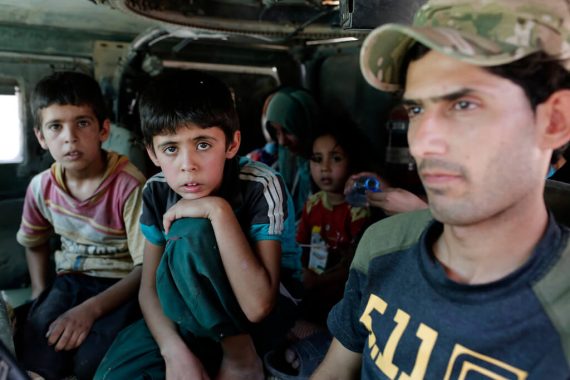It has been ten years since popular protests in Syria against Assad’s regime started. Many European governments became involved in the armed conflicts in Syria and Iraq, while a number of their citizens became foreign fighters by joining the Syrian civil war as members of armed groups in conflict zones.
Some have joined different jihadist or militant opposition groups such as Jabhat al-Nusra and Daesh (ISIS), while others in Northern Syria are fighting in the ranks of the YPG, the Syrian branch of the PKK terror group.
An estimated 40,000 foreign fighters are members of the terror group Daesh (ISIS), including nearly 5,000 European citizens. According to the Dutch General Intelligence and Security Service (AIVD), around 305 of them are Dutch. Among them, there are children who unwillingly bear the responsibility for their parents’ decisions.
The children are European citizens left to face their fate without any foreseeable future. Dutch sociologists, lawyers, and human rights activists have shared their concerns over these children’s situation and future in Iraq and Syria. However, European countries do not offer any help to protect them. What is the reason?
In June 2020, the Supreme Court of the Netherlands ruled that the Dutch government is not obliged to bring Dutch Daesh women and their children back from refugee camps in Northern Syria. The state has put forward the following reasons: First, the national security in the Netherlands and other Schengen countries, which would be endangered if they return.
Second, the security risks that Dutch officials and other parties would be exposed to when bringing them back from Northern Syria. Third, the Dutch international reputation in Northern Syria may be adversely affected by contacting state and non-state actors.
The chairman of the Dutch Supreme Court indicated that human rights treaties are not directly applicable in this case, since these women are outside Dutch territory. How legitimate is this provision? Does the application of human rights treaties end as soon as one crosses the Dutch border?
Besides the Netherlands, other Schengen countries are faced with the dilemma of the repatriation of Daesh women and their children. The German and French governments last year declared that they would bring the foreign fighters back and assess the situation on an individual basis. According to the Geneva-based United Nations Human Rights Committee, Belgium is expected to guarantee the return of its nationals. However, the Court of Appeal in Brussels ruled in February 2019 that a group of women and their children do not have to be repatriated by the state.
Child returnees from conflict zones
The retrieval of Daesh fighters is and will remain a difficult issue as it is an unprecedented incident. However, this cannot be said about the situation of the children who are in conflict zones. There have been development programs aimed at child soldiers in the Congo and other parts of Africa, where the return to society has had a positive effect on them.
There is, therefore, a possibility with the help of de-radicalization programs for European children to return from the Syrian civil war. According to reports from the UN Security Council, children in Syria are being used as suicide bombs and to carry weapons which makes them vulnerable to indoctrination. The children of European foreign fighters in refugee camps under the YPG’s control suffer even further because of the humanitarian crisis and the constant uncertainty they live in.
Recommended
The right to family reunification
Under international law, children cannot be legally separated from their parents. When children arrive in the Netherlands, they have the right to family reunion. This means that the return of mothers could also be possible. Most conservative and right-wing politicians propose bringing back only unaccompanied children whose parents have died. But should the problem be solved by fighting inhumanity with inhumanity?
Regardless of how difficult the situation might be, European politicians should keep in mind that these women and children are human beings entitled to the basic human rights that apply to everyone on Earth. Leaving European nationals to face their own fates is wrong. International human rights treaties and laws provide a solid legal framework, but when it comes to the application of these laws and to people’s sensitivity regarding foreign fighters and their families, there is still a lot of work to be done.





